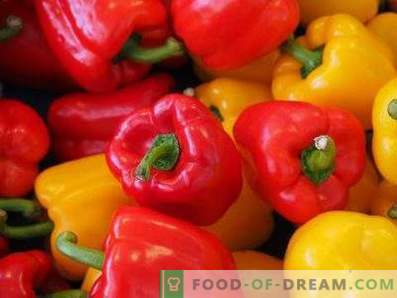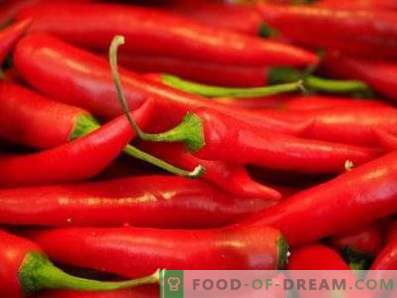
Bulgarian pepper is one of the most famous varieties of capsicum grown in all parts of the world with a tropical, subtropical or temperate climate. The homeland of culture is South America: in the territory of the continent and today there are wild species of this plant. Nevertheless, today Spain, Hungary, Italy, Bulgaria, Greece and Romania are considered the largest producers of this product and its suppliers to the world market.
Bulgarian pepper is an annual herb with a powerful branching pentahedral or tetrahedral stem of green color. In open ground, the plant can reach a height of 1, 3 meters. The green leaves of the bell pepper, sitting on well-developed petioles, are lanceolate or egg-shaped. Leaf blades can reach 140 mm in length and 70 mm in width.
The plant blooms at the beginning of summer with small wheel-shaped flowers of white color. Fruits of the Bulgarian pepper are large hollow berries, having the form of a thick-walled blunt at the end of a four-sided pyramid. Inside each of them you can find a lot of flat round seeds of white or pale yellow color. Mature fruits have a yellow or red color, but they are often harvested still green (as such, they are ideal for canning).
Bulgarian pepper is eaten raw, baked, stewed, pickled or salted. Also, the fruits of the plant are stuffed with vegetables, cereals and minced meat, used for cooking lecho, soups and salads. With moderate consumption, Bulgarian pepper has a complex healing effect on the body.
Nutritional value of bell pepper
100 g of bell pepper contains:
- 0 792 g of proteins;
- 0, 312 g of fat;
- 6,622 g of carbohydrates;
- 0, 963 g of dietary fiber;
- 91, 486 g of water;
- 0, 572 g of ash;
- 3, 492 g of sugars.
Also in the composition of this product, essential amino acids are present in a small amount (arginine, phenylalanine, histidine, threonine, valine, tryptophan, isoleucine, lysine, leucine, methionine) and fatty acids (linolenic, oleic, myristic, linoleic, stearic and palmitic ).
Vitamins in the composition of the product
The following vitamins are present in 100 g of bell pepper:
- folic acid, B9 - 52, 656 µg;
- retinol equivalent, A - 40, 362 μg;
- choline, B4 - 7, 629 mg;
- phylloquinone, K - 9, 861 mkg;
- thiamine, B1 - 0, 078 mg;
- tocopherol equivalent, E - 0, 476 mg;
- pyridoxine, B6 - 0, 516 mg;
- ascorbic acid, C - 92, 874 mg;
- riboflavin, B2 - 0, 054 mg;
- niacin equivalent, PP - 1, 089 mg;
- pantothenate, B5 - 0, 203 mg.
Calories of Bulgarian pepper
100 g of raw Bulgarian pepper contains 28, 563 kcal. The energy value of 1 medium fruit (200 g) is 57, 126 kcal. The caloric value of 100 grams of stewed pepper is 28, 893 kcal, baked - 28, 136 kcal, boiled - 27, 691 kcal, marinated - 31, 462 kcal.
Useful items in the product
Macro elements in 100 g of Bulgarian pepper:
- 201, 674 mg of potassium;
- 15, 924 mg of magnesium;
- 11, 732 mg of calcium;
- 28, 618 mg of phosphorus;
- 0, 924 mg of sodium.
Trace elements per 100 g of product:
- 0, 457 mg of iron;
- 114, 032 mcg copper;
- 0, 289 mg of zinc;
- 0, 203 mg of manganese;
- 0, 266 mcg of selenium.
How to choose and store Bulgarian pepper
The quality fruits of the bell pepper are clean, resilient, smooth and shiny. On their surface there are no cracks, mechanical damage and stains. When choosing vegetables, it is very important to pay attention to the following signs of product quality:
- no wrinkles on the surface of the fetus;
- uniform, bright, saturated coloring of the skin (the paleness of the fruit indicates that they were grown with a violation of the technological process or were stored for too long in the consumer packaging);
- juicy green stem (dried brown tail says that the vegetable was lying on the counter for at least a week and lost most of its useful properties);
- no plaque on the surface of the fetus.
Grounds for refusing to buy Bulgarian pepper can be:
- damaged or shriveled vegetable skin;
- the presence on the surface of the fetus plaque, dirt, mold, stains, points;
- signs of rotting;
- lack of stem.
Good ripened fruits should be stored in a dark place at a temperature not higher than 4 ° C (for example, in a refrigerator). In such conditions, they do not lose taste and nutritional properties for 3-4 weeks. In order to increase the shelf life, it is necessary to wrap each vegetable in paper.
Green peppers can not be stored in the refrigerator. In cool conditions, immature fruits begin to deteriorate, rot, quickly lose their taste properties. Such vegetables are best kept at room temperature at a maximum distance from heat and light.
If desired, the Bulgarian pepper can be frozen. In the freezer the fruits of the plant retain their qualities for 6-8 months. However, this storage method has a drawback: after thawing, the vegetables change structure and become too soft.
The benefits of bell peppers
- Bulgarian pepper is one of the richest food sources of ascorbic acid for the human body. The dishes prepared from it help to strengthen the immune system, increase the body's ability to resist infections, give additional strength and elasticity to the capillaries, increase the indicators of physical endurance.
- Bulgarian pepper helps to fill the body's need for retinol. This increases visual acuity, reduces the load on the visual apparatus during prolonged reading or working at a computer, improves the condition of the mucous membranes, hair and skin.
- Vitamins of group B, with which the product is rich, help to strengthen the central and peripheral nervous system, avoid nervous breakdowns and depressions, improve sleep, overcome fatigue. In addition, these compounds accelerate the metabolism and oxygen metabolism in the body.
- It has been proven that dishes from this product reduce the concentration of sugar in the blood. Therefore, nutritionists advise people with diabetes to include them in the diet menu at least 2 times a week.
- Substances present in bell peppers prevent the retention of excess water in the body, reduce the risk of edema.
- The mineral complex and vitamins contained in the Bulgarian pepper contribute to the production of hemoglobin, improve the blood composition, and help to avoid anemia.
- Nutritionists recommend dishes from this product to people suffering from excessive sweating.
- The alkaloid capsaicin, which is present in the vegetable pulp, stimulates the digestive tract, activates the production of enzymes that promote fat loss, destroys cancer cells, increases the acidity of gastric juice and reduces the risk of diseases developing against the background of this pathology.
- Bulgarian pepper increases appetite. However, this low-calorie and tasty product does not contribute to the set of overweight and can be included in the diet menu of people suffering from obesity.
- Bulgarian pepper activates brain activity, increases concentration, improves memory.
- The substances present in this product help to slow the pathological hair loss.
- Antioxidants, with which Bulgarian pepper is rich, reduce the risk of tumor tumors. Also, these compounds slow down the processes associated with the natural aging of the body.
- Regular consumption of Bulgarian pepper helps to strengthen the bone system and minimize the risk of osteoporosis.
- The beneficial compounds that enter the body through the use of this product help to thin the sputum and speed up its elimination from the organs of the respiratory system. Therefore, dishes based on it are recommended for diseases accompanied by a wet cough.
- Bell pepper juice is a mildly effective laxative. In order to get rid of constipation, it is enough to drink half a glass of this drink or eat 2-3 juicy fruits of the plant.
- With regular consumption of Bulgarian pepper, toxins, poisons and other toxic substances are eliminated from the body at an accelerated rate.
- Dishes from this product can reduce the concentration of harmful cholesterol in the blood, prevent the formation of cholesterol deposits in the lumen of blood vessels and reduce the risk of atherosclerosis.
- Bulgarian pepper is useful for joint inflammation. Substances present in its composition, help to weaken the pain syndrome, prevent the spread of the inflammatory process, slow down dystrophic tissue changes.
- Useful compounds that enter the gastrointestinal tract by the use of bell pepper, reduce the risk of developing dermatological diseases.
- It has been proven that dishes from this product have a positive effect on the reproductive system in both sexes. With their regular consumption reduces the risk of developing inflammatory diseases of the urinary tract, increases the likelihood of conception. Women who supplement their diet with Bulgarian pepper, more easily tolerate menopause.
Contraindications and harm to Bulgarian pepper
- Bulgarian pepper is a vegetable that can provoke allergic reactions. Therefore, people who are allergic to these and other vegetables should completely abandon their consumption.
- Abuse of Bulgarian pepper leads to the development of diarrhea, flatulence, and abdominal distension.
- The product is contraindicated for people suffering from cardiac diseases - high blood pressure, heart ischemia, arrhythmia.
- The fruits of Bulgarian pepper are harmful to people who have been diagnosed with gastritis, which has developed against the background of an increase in the acidity of gastric juice. From the consumption of these vegetables should be abandoned and with gastric ulcer.
- Nutritionists do not recommend dishes from Bulgarian pepper to people suffering from epilepsy, hemorrhoids, liver or kidney diseases.
- Bulgarian pepper is useful to eat only fresh. Fruits that have undergone any heat treatment lose up to 70% of their beneficial properties.























